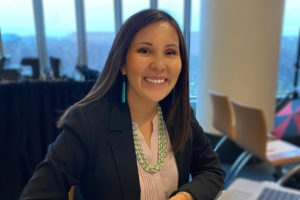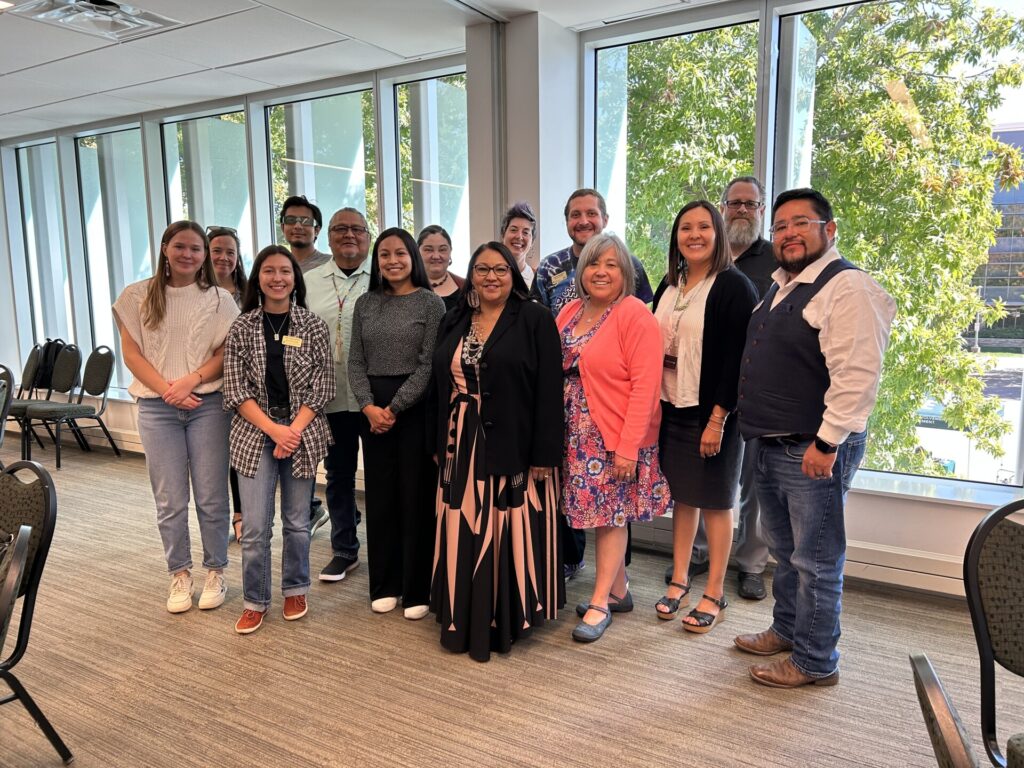Colorado State University Native American students Miya Chavez (Pueblo of San Felipe, Pueblo of Cochiti and Navajo Nation), Hanna Medina (Pueblo of Jemez and Pueblo of Zia) and Jared Hodison (Navajo Nation) reflect on what Indigenous Peoples’ Day means to them.
 Fort Collins and Colorado State University are among the numerous communities across the country that now celebrate the second Monday of October as Indigenous Peoples’ Day, and in 2021, President Joe Biden officially recognized it as a federal observance.
Fort Collins and Colorado State University are among the numerous communities across the country that now celebrate the second Monday of October as Indigenous Peoples’ Day, and in 2021, President Joe Biden officially recognized it as a federal observance.
The day recasts what was previously recognized as Columbus Day to instead honor the contributions and resilience of the communities that were in the Americas long before European settlers. Patrese Atine, Colorado State University’s first assistant vice president for Indigenous and Native American Affairs, said she hopes these conversations happen for more than just 24 hours.
“I want people to reflect, celebrate and honor our indigenous communities throughout the year,” she said.
Atine, who has been in her position since March, leads CSU’s outreach to tribal communities and works with their leadership to increase student retention and enrollment, as well as engages with the campus community on Native and Indigenous issues.
She sat down with SOURCE for a Q&A on the importance of Indigenous Peoples’ Day and her work serving that community at CSU and beyond.
Upcoming events
Monday, Oct. 9: The Native American Cultural Center will host a CSU Indigenous Peoples’ Day celebration on the Lory Student Center Plaza from 11 a.m. to 2 p.m. Popcorn and hot chocolate will be available while supplies last.
Saturday, Oct. 21: CSU will hold its 39th annual Powwow in the Lory Student Center Grand Ballroom from 10 a.m. to 10 p.m. This year’s theme is “We are Still Here: Keeping our Traditions Alive.”
Learn more about these and other events at: https://nacc.colostate.edu/
SOURCE: What should the CSU community know about Indigenous Peoples’ Day, and what do you hope that people reflect on during this holiday and beyond?
This widely observed holiday is a formal recognition and opportunity to honor our indigenous peoples and all of their communities, cultures and traditions. States and cities across the U.S. have adopted the holiday since the late 1980s, creating an opportunity to retell history more accurately.
For instance, did you know there are 48 federally recognized tribes that have ancestral and historical ties to the state of Colorado?
The CSU Land Acknowledgement formally recognizes the histories of Tribal Nations who lived and stewarded the land where the University now resides. Each and every day at CSU we have a responsibility to actively serve and partner with our tribal communities.
We recognize the Arapahoe, Cheyenne and Ute Nations as original stewards of this land – their history is our history. I challenge everyone on campus to learn more about the creation of the land-grant system and its impact on Tribal Nations.
In addition to learning about the unique histories of these Tribal Nations, it’s equally important to learn about these present-day tribal communities.
Also, did you know approximately 300 Indigenous languages were once spoken in the U.S.?
Indigenous languages, cultures and traditions vary by community and region. The CSU Native American Cultural Center supports our students and community in celebrating and honoring these culturally diverse heritages.
I am impressed by the leadership of our CSU Native American students who are sacrificing hundreds of hours to create a space and event to honor our traditions through the annual CSU Powwow.
Tell us about the work you do on behalf of the Indigenous community inside and outside of CSU.
In March 2023, I joined a dedicated community of Native American students, faculty and staff who have been working for decades on campus to increase the visibility of the tribal community on campus. Because of their tireless advocacy, we’re able to celebrate Indigenous Peoples’ Day at CSU.
In this role I serve as the primary liaison to tribal communities on behalf of the University. As a land-grant institution, we have a responsibility to serve tribal communities as committed partners in addressing their needs. I’ve been focused on increasing awareness of the wide array of CSU opportunities, initiatives and programs for Native American students and tribal communities.
As part of this, I’ve invited tribal leaders, tribal organizations and tribal partners to visit us on campus. Last week we had a visit from the Native Forward scholarship organization to showcase CSU support programs for students and tribal communities. Native Forward hosted a fantastic information session about funding opportunities and resources available for students and faculty.

What else do you think people should know about Indigenous Peoples’ Day?
We’re still here. Reach out. Tribal Nations and tribal communities are everywhere. Invite us into your conversations. And be prepared to actively listen, learn and take action. For far too long our voices have been silenced. Long-term change requires true collaboration, engagement and commitment. Honoring Indigenous Peoples’ Day is a step in the right direction, but there’s so much more to do.